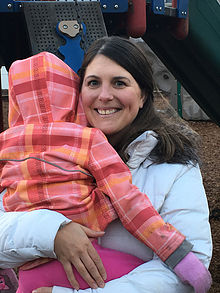This is the last in our parenting and relationships series with our resident parenting expert, Alex, and its’ a goooood one. We are getting into how your different parenting styles are affecting your marriage. The good, the bad, and the ugly. Let’s get to it:

The first argument that we ever had as parents was about breastfeeding.
I remember it vividly because until that moment, although we had had our fair share of arguments, none had ever been fueled by our individual need to do what was best for someone we each loved so fiercely. Our individual desire to do what was best for this little person fueled our anger in a way that it had never done before, and in that moment it felt like we were standing miles apart.
We’ve had many arguments about parenting since.
About eating habits, about thumb-sucking, about who’s way is right and who’s way is wrong. Often, I accuse my husband of being too authoritative in his parenting style. Whether it be in his insistence on “3 more bites of chicken” or on wearing the proper footwear. Likewise, my husband often accuses me of being too “new agey” or “hippee-dippe” in my parenting style.
In fact, at the root of the majority of our parental disagreements, is a difference in parenting style.
On one hand, a difference is parenting style can be a positive thing, as it demonstrates to children that it is okay to have different approaches to a problem. On the other hand, it can lead to confusion in the mind of a child, due to the fact that children are constantly required to adapt to each adult’s style (not to mention the resentment it can cause between spouses!).
My husband and I have argued about my daughter’s eating habits a thousand times over the years and have gotten nowhere. Typically, our discussion on this topic has ended with both of us feeling angry.
Yet, a few months ago, something was different. For what felt like the first time in our parenting journey, we approached the problem in a very unbiased and non-confrontational way.
Through this experience I learned that a difference in parenting style may not be that terrible after all. Based on this experience, I’ve come up with 5 tools to help you and your spouse “get back on the same page” when there is a difference in parenting style.
1. Actively Listen To Each Other
Listen, and I mean really listen to what the other person has to say. This is something that I often struggle with because my ‘go to’ tends to be to get defensive when my husband and I disagree on parenting issues. Yet, during this particular discussion something was different. I didn’t instantly get defensive or accuse my husband of approaching the situation “the wrong way.” And my husband didn’t fall into his typical argument patterns either. Instead, we really listened to each other which can go a long way in getting your own point of view heard.
2. Be Open To What The Other Person Has To Say
This goes hand and hand with listening because it involves actively listening without waiting to jump in with your next point. What made this disagreement stand out from all the rest is that, when my husband expressed his desire to have our daughter understand that food was energy for her body and that this was at the root of him trying to get her to eat more, I really heard him. Because for the first time, I was open to hearing his point of view. When he finished, I expressed the fact that I thought it was important for kids to be able to self-regulate and not be forced to eat when they didn’t want to eat. And it felt like my husband was open to hearing what I had to say too with no counter argument waiting to be had.
3. Recognize that Differences in Opinions Are Okay
My husband often says that “two smart educated people will never agree on everything.” I totally agree with this and actually think this is what helps keep relationships and friendships interesting. I love a good debate and yet in parenting, I often focus on how my parenting style is right and my husband’s is wrong. In reality, they are just different. Recognizing that it is ok to approach something differently, goes a long way in understanding the reasoning behind a person’s choice to parent a certain way.
4. Stay Calm
When it comes to arguments, rooted in a difference in parenting style, my point often gets lost because I forget to stay calm. As a result, I often get defensive and adamant about why I’m right. However, in this particular argument, I showed an impressive amount of calm which changed the dynamic from a defensive argument to a mature discussion.
5. Strategize Together
One of the things that made this particular disagreement in parenting so different from all the rest is that at the end of it, we strategized on what to do as a team. We discussed what appropriate table manners looked like for each of us, why they were important, and came up with what we thought were realistic expectations for our daughter. Through our strategizing, we realized that we essentially had the same expectations. Yet, we had spent so much time over the years arguing about how each person was approaching the situation “the wrong way.”
It’s so easy to forget that in parenting, spouses are actually on the same team.
Sometimes it feels we are standing there fighting for the little people we love at all costs.
Imagine what it would be like if we approached each difference in parenting with an open mind?By really listening to each other, we may find that our goals are actually more similar than we initially thought. At the end of the day, at the root of it all, is a marriage. And so sometimes, reminding ourselves that, “we are fighting the same war,” goes a long way.
And at the end of the day, at the root of it all, is a marriage and reminding ourselves that “we are fighting the same war” can go a long way.
As always, Alex is on point! Thank you for joining this series on parenting and relationships! If you’d like to know more about Alex and what she’s up to, check her out here:

Alexandra Vigue
Alexandra Vigue is an educator, a childcare provider, an entrepreneur, mom and blogger living in Vancouver BC. Find her over at www.alexandravigue.com or on instagram @letstalkparenting.





Leave a Reply